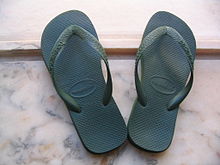Klipklapper

Klipklappere er en type letpåtageligt fodtøj, som typisk anvendes om sommeren. De anvendes typisk i uformelle omgivelser, fx til udendørs og på stranden.
Klipklapper er blevet anvendt af mange kulturer over hele verden og er blevet anvendt så tidligt som 4000 f.Kr. i Ægypten. Den moderne klipklapper stammer fra den japanske zōri, som blev populær efter 2. verdenskrig, da amerikanske soldater bragte klipklappere tilbage til USA. Klipklappere blev populært sommerfodtøj hos begge køn i 1960'erne, 1990'erne og 2000'erne og nogle klipklapper varianter bliver endda anvendt i formelle omgivelser på trods af en del menneskers aversion.
Der er stærke kvindelige meninger om man (især mænd) må tage sokker på i klipklappere og sandaler. Sokker i klipklappere er ganske enkelt mere komfortabelt, da klipklapperne så klistrer mindre til fødderne. Sokkerne mindsker muligheden for snavs, sand og småsten mellem tæerne.
Eksterne henvisninger
| ||||||||||||||||||||||||||||||||||||||||||||||||||
| Spire |
Medier brugt på denne side
D.A.R.E. T-shirt
This is a pair of leather sandal soles. Each sole consists of a single piece of cut leather. There are fine cracks and some areas of discoloration on the reddish-brown leather, but generally it is in a good state of preservation. The sandals appear to have been worn during life because there are signs of wear on the bottoms and there are molded impressions of the heal, toes and the ball of the foot on the upper surface. There is a round hole punched into each sole for the attachment of a thong between the first and second toes. Leather ankle straps secured the back of the sandal. Complete examples in the Museum of Fine Arts have a strap that completely encircles the ankle heel. On the right sole only an indentation on each side marks the location of the sandal strap. On the left sole a small section of the original strap remains on the right edge and this strap was part of the same piece of leather as the sole. On the left edge we have evidence of a repair, which is also an indication of daily life use. Two holes were punched into the edge of the sole and a new strap was fixed into place by leather thongs. Only a short length of this new strap remains in place. There is a rectangular area of discoloration on the upper surface of the left sole near the toe area.
Forfatter/Opretter: Kok Leng Yeo from Singapore, Singapore, Licens: CC BY 2.0
In Apr/May 2009, I took 15 days to walk all the way from Tokyo to Kyoto, roughly following the 546km long, ancient highway, the Nakasendo, alone. This picture was taken during the free week I had in Japan after the walk. Read about my preparations and my time in Japan at 546km.blogspot.com.
Havaianas flipflops: footwear Made in Brasil.
Forfatter/Opretter: Ukendt, Licens: CC BY-SA 4.0
Sundhedssandaler fra 1960'erne. Et par sundhedssandaler ("vitaminski") af asketræ med læderremme med spænde over vristen. Under bunden er limet tynde såler af kunststof.









